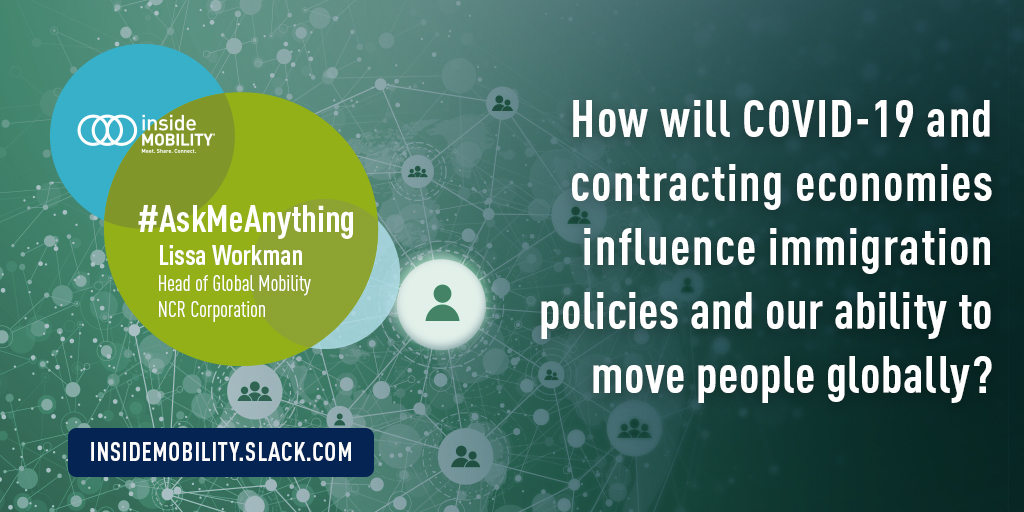Global Mobility and the Global Pandemic: Graebel’s third AMA Session on Slack

Graebel’s Slack community for in-house mobility professionals is a unique, peer-to-peer platform with over 200 members to date. It enables an ongoing exchange of ideas and dialogue on industry issues and developments, while also extending virtual networking opportunities globally.
Graebel’s third Ask-Me-Anything (AMA) Slack session recently considered how COVID-19 and contracting economies will influence immigration policies and our ability to move people globally.
To host the session, Graebel enlisted subject matter expert Lissa Workman, Head of Global Mobility at NCR Corporation. An innovative global mobility and HR leader, Workman specializes in the facilitation of global business objectives through strategy and execution programs for the movement of people worldwide.
During an hour-long session, attendees were able to ask Workman anything they wanted on the subject of COVID-19 and immigration. With posted questions answered in real time via on-screen text dialogue, Workman provided expert guidance on how to address the challenges linked to global mobility during the global pandemic.
Immigration policy and process
Workman began by addressing several questions relating to potential changes in immigration policy in the wake of COVID-19. Considering the need to balance national economy recoveries with the global war for talent, Workman said she expects to see the introduction of “reduced quotas and higher minimum salaries”. By way of example she pointed to Singapore and Saudi Arabia, where such policy changes have already been implemented.
She also advised that the costs of immigration are going to rise over the next three years as a result of the global pandemic, explaining that cost increases are “an easy way to create barriers and protect local workers, whether through fees, minimum salaries [or other] formats”. Fees like those linked to UK National Insurance, she added, are the biggest drivers of immigration cost.
Regarding the long-term impact of COVID-19 on immigration process, Workman considered the issue of automation and digitization. Acknowledging that while digitization is certainly possible, she questioned whether governments “will want to speed [up] processing if they are [looking to protect] local workers… It will be interesting to see”.
Consulate conundrums
In response to queries from participants about consulate access and appointments, Workman described how “we are seeing some countries start to open consulates”. But she added that “it all depends on what is happening in that locale from a general re-opening perspective”. The Czech consulate in Vienna, for example, is open for certain types of visa appointment, while the consulate in Belgrade remains closed for routine visa applications.
On the subject of consulates, several participants were keen to hear about US employees, asking whether they are still taking assignments in EMEA, or whether they are reluctant to leave home soil.
“I think people are getting restless,” said Workman. “So I think [they] are [increasingly] willing to move.” She also advised companies to ensure that all US nationals working overseas are well aware of the current restrictions when visiting consulates for home country travel, visa extensions or renewals. “Warn them that changes could come while they are gone,” she urged, explaining that companies need to prepare their employees in case they get stuck outside their country of assignment.
COVID and Brexit
Alongside the global pandemic, politics also threatens to impact the global mobility landscape in the months ahead. Indeed, as one participant observed, COVID plus Brexit “is not a nice mix”, exacerbating uncertainty and volatility and making for a “challenging winter” for global mobility professionals.
Asked to outline NCR Corporation’s response to Brexit at this time, Workman said that her team is “providing analysis to the business on where they have used EU workers previously and highlighting…that these roles will require sponsorship in 2021 if the candidates are not already in the UK”.
Workman then went on to explain that NCR are assessing EU short-term productive workers entering the UK after December 31 “on a case-by-case basis as business travelers”. This, she said, was the approach taken “for any other country combination”, with businesses being advised what they need to do from an immigration perspective. “It won’t be popular,” she added, “but in time [companies] will get used to it”.
Find out more
Throughout this online AMA session, participants were keen to hear about all manner of issues and insights linked to COVID-19 and global mobility. H1B occupation rules, FDNS site inspections, and remote working policies were just some of the subjects covered. Workman’s response to specific questions, and the discussions that followed, can be found in full at insidemobility.slack.com. Join our insideMOBILITY Slack Community, and find out about future AMA sessions, here. Graebel also offers wider support on program benchmarking and performance, as well as expert guidance on specific projects.